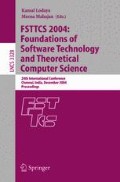Abstract
A computational model for learning languages in the limit from full positive data and a bounded number of queries to the teacher (oracle) is introduced and explored. Equivalence, superset, and subset queries are considered. If the answer is negative, the teacher may provide a counterexample. We consider several types of counterexamples: arbitrary, least counterexamples, and no counterexamples. A number of hierarchies based on the number of queries (answers) and types of answers/ counterexamples is established. Capabilities of learning with different types of queries are compared. In most cases, one or two queries of one type can sometimes do more than any bounded number of queries of another type. Still, surprisingly, a finite number of subset queries is sufficient to simulate the same number of equivalence queries when behaviourally correct learners do not receive counterexamples and may have unbounded number of errors in almost all conjectures.
Access this chapter
Tax calculation will be finalised at checkout
Purchases are for personal use only
Preview
Unable to display preview. Download preview PDF.
References
Angluin, D., Hellerstein, L., Karpinski, M.: Learning read-once formulas with queries. Journal of the ACM 40(1), 185–210 (1993)
Angluin, D.: Finding patterns common to a set of strings. Journal of Computer and System Sciences 21, 46–62 (1980)
Angluin, D.: Learning regular sets from queries and counter-examples. Information and Computation 75, 87–106 (1987)
Angluin, D.: Queries and concept learning. Machine Learning 2, 319–342 (1988)
Angluin, D.: Queries revisited. In: Abe, N., Khardon, R., Zeugmann, T. (eds.) ALT 2001. LNCS (LNAI), vol. 2225, pp. 12–31. Springer, Heidelberg (2001)
Bārzdiņš, J.: Two theorems on the limiting synthesis of functions. In: Theory of Algorithms and Programs, Latvian State University, vol. 1, pp. 82–88 (1974) (in Russian)
Baliga, G., Case, J., Jain, S.: Language learning with some negative information. Journal of Computer and System Sciences 51(5), 273–285 (1995)
Case, J., Lynes, C.: Machine inductive inference and language identification. In: Nielsen, M., Schmidt, E.M. (eds.) Proceedings of the 9th International Colloquium on Automata, Languages and Programming. LNCS, vol. 140, pp. 107–115. Springer, Heidelberg (1982)
Case, J., Smith, C.: Comparison of identification criteria for machine inductive inference. Theoretical Computer Science 25, 193–220 (1983)
Gasarch, W., Martin, G.: Bounded Queries in Recursion Theory. Birkhäuser, Basel (1998)
Gold, E.M.: Language identification in the limit. Information and Control 10, 447–474 (1967)
Ibarra, O., Jiang, T.: Learning regular languages from counterexamples. In: Proceedings of the Workshop on Computational Learning Theory, pp. 337–351. Morgan Kaufmann, San Francisco (1988)
Jain, S., Kinber, E.: Learning language from positive data and negative counterexamples. In: Algorithmic Learning Theory: Fifteenth International Conference ALT 2004, Springer, Heidelberg (2004);(to appear)
Jain, S., Kinber, E.: Learning languages from positive data and finite number of queries. Technical Report TRC4/04, School of Computing, National University of Singapore (2004)
Jain, S., Osherson, D., Royer, J., Sharma, A.: Systems that Learn: An Introduction to Learning Theory, vol. 2. MIT Press, Cambridge (1999)
Kinber, E.: Learning a class of regular expressions via restricted subset queries. In: Jantke, K. (ed.) Analogical and Inductive Inference, Proceedings of the Third International Workshop. LNCS (LNAI), vol. 642, pp. 232–243. Springer, Heidelberg (1992)
Lange, S., Nessel, J., Zilles, S.: Learning languages with queries. In: Proceedings of Treffen der GI-Fachgruppe Maschinelles Lernen (FGML), Learning Lab Lower Saxony, Hannover, Germany, pp. 92–99 (2002)
Lange, S., Zilles, S.: Comparison of query learning and gold-style learning in dependence of the hypothesis space. In: Ben-David, S., Case, J., Maruoka, A. (eds.) ALT 2004. LNCS (LNAI), vol. 3244, pp. 99–113. Springer, Heidelberg (2004)
Lange, S., Zilles, S.: Replacing limit learners with equally powerful one-shot query learners. In: Shawe-Taylor, J., Singer, Y. (eds.) COLT 2004. LNCS (LNAI), vol. 3120, pp. 155–169. Springer, Heidelberg (2004)
Nessel, J., Lange, S.: Learning erasing pattern languages with queries. In: Arimura, H., Sharma, A.K., Jain, S. (eds.) ALT 2000. LNCS (LNAI), vol. 1968, pp. 86–100. Springer, Heidelberg (2000)
Osherson, D., Stob, M., Weinstein, S.: Systems that Learn: An Introduction to Learning Theory for Cognitive and Computer Scientists. MIT Press, Cambridge (1986)
Osherson, D., Weinstein, S.: Criteria of language learning. Information and Control 52, 123–138 (1982)
Rogers, H.: Theory of Recursive Functions and Effective Computability. McGraw-Hill, New York (1967); Reprinted by MIT Press in 1987
Sakamoto, H., Hirata, K., Arimura, H.: Learning elementary formal systems with queries. Theoretical Computer Science A 298, 21–50 (2003)
Zeugmann, T., Lange, S.: A guided tour across the boundaries of learning recursive languages. In: Jantke, K., Lange, S. (eds.) Algorithmic Learning for Knowledge-Based Systems. LNCS (LNAI), vol. 961, pp. 190–258. Springer, Heidelberg (1995)
Author information
Authors and Affiliations
Editor information
Editors and Affiliations
Rights and permissions
Copyright information
© 2004 Springer-Verlag Berlin Heidelberg
About this paper
Cite this paper
Jain, S., Kinber, E. (2004). Learning Languages from Positive Data and a Finite Number of Queries. In: Lodaya, K., Mahajan, M. (eds) FSTTCS 2004: Foundations of Software Technology and Theoretical Computer Science. FSTTCS 2004. Lecture Notes in Computer Science, vol 3328. Springer, Berlin, Heidelberg. https://doi.org/10.1007/978-3-540-30538-5_30
Download citation
DOI: https://doi.org/10.1007/978-3-540-30538-5_30
Publisher Name: Springer, Berlin, Heidelberg
Print ISBN: 978-3-540-24058-7
Online ISBN: 978-3-540-30538-5
eBook Packages: Computer ScienceComputer Science (R0)

